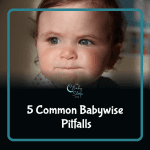
We’ve talked about how Babywise may or may not be right for your baby’s sleep, why Pantley’s No Cry Sleep Solution doesn’t always work, and about Dr. Sears and Weissbluth’s online chat about baby sleep. This article will talk about the differences and similarities between Ferber and Weissbluth. Which one will be better (or not) for your baby’s sleep?
Who are Ferber and Weissbluth?
Most people know Ferber’s name because of the now popular term “Ferberizing.” Ferberizing is a method for sleep training your baby, which involves letting him cry while you check on him at intervals. But, actually, if you read Ferber’s book, Solve Your Child’s Sleep Problems, there is a lot more information that is useful to know. Such info includes how sleep develops in your baby, how sleep phases and biological/internal clocks work, the difference between night terrors and nightmares, how to deal with bed wetting, and much more.
Weissbluth, author of Healthy Sleep Habits, Happy Child, stresses the importance of healthy sleep habits in young babies and children. He introduced the term “extinction,” illustrates why an early bedtime is of extreme importance, and also theorizes that some children diagnosed with ADHD really simply need more sleep (not all, of course).
Similarities Between Ferber and Weissbluth
For which they’re most famously known, both Weissbluth and Ferber both strongly advocate using a crying method to sleep train your baby. They both also provide guidelines on how to do so. Weissbluth’s “graduated extinction” is similar to Ferber’s method which I call “check and console.” Neither Ferber nor Weissbluth advocate this method for all sleep problems, however. It’s not like Ferber or Weissbluth suggest letting your baby cry it out after a nightmare or wetting the bed, for example. Both primarily discuss allowing your baby to cry in order to change sleep associations and teach your baby how to self-soothe.
Differences Between Ferber and Weissbluth
Ferber and Weissbluth do have some differences in opinion on quite a few things, which is what confuses a lot of people! In fact, I’ve found that almost all baby sleep books contradict each other!
The first big difference is the average amount of sleep your baby needs. If you look at Weissbluth’s averages (~14 hours in a day for a young baby) and then look Ferber’s, Ferber’s are MUCH lower, in general. In fact, pick up 5 books and read this site and we are all likely to have different averages.
Ferber says to go in and check and reassure your baby at intervals. Weissbluth, while offering 4 different methods of sleep training, strongly suggests “extinction” (or not going in at all) yields the fastest results and is least confusing to baby.
Weissbluth strongly urges parents to put baby to sleep early (as early as 5 p.m., if necessary), while Ferber suggests that later bedtimes are often required to avoid your baby waking too early in the morning. Ferber also recommends very strict schedules for inconsistent babies.
Weissbluth discusses how your baby’s temperament will be a guiding factor in your experience with your baby’s sleep. Ferber doesn’t seem to touch on this much, if at all.
Weissbluth says that many babies will need 1-2 night feedings up through 9 months while Ferber indicates babies need just one feeding at 3 months and none after 4-5 months old.
These are just a few of the differences and there are more. These are the ones that have come up most in my 15+ years of personalized consultations.
So, Ferber or Weissbluth for your baby?
First, if I asked 10 of you how much sleep your babies get and then asked another 10 people, I would get different averages from each group. Keep in mind that the sources of averages are based on a finite number of babies and is just a sample. Averages are just that. You should use them as guidelines, not the end all, be all. Your baby has unique sleep needs, so respect those. Log her sleep for 1-2 weeks every so often and you will know how much sleep she needs, on average. (Every day may not be the same.) In my experience with my own children and thousands of families that I’ve helped, Ferber’s averages are much too low for young babies, but seem exactly right around 2 years old and up.
On occasion, I’m asked the question about whose ‘camp’ I’m in. The answer is that I’m not really in anyone’s camp. Just like Pantley’s No Cry Sleep Solution will work great for one family, it won’t for another. I can tell you that, in my experience, it is better to follow Weissbluth’s early bedtime ideas in young babies and young toddlers up to two years old, in many circumstances. I have seen an earlier bedtime make HUGE differences alone in many family’s situations.
However, I find a 5 or 5:30 or even a 6 p.m. bedtime not very practical for most families. Even IF your baby can sleep 12 hours (mine slept just 11 to 11 1/2 at a young age), that means a ~5 a.m. wake-up time and you can get yourself into a perpetual early schedule. And, if you’re a working parent, that means either not seeing your baby at night or simply an impossible bedtime. But, after 9-10 months old, the lines start to blur and I really see Ferber’s ideas on sleep phases and internal clocks kick in for many babies and toddlers, along with stricter clock schedules doing wonders. All in all, it really depends on the baby.
I will wholeheartedly disagree with Ferber’s notion that all/most babies only need one feeding at 3 months and none by 4-5 months old, especially breastfed babies. True, maybe a baby won’t lose weight or become unhealthy. But this doesn’t mean he can comfortably go long periods without feeding from that young age, either. I do see some babies do very well without feedings at a young age, but definitely not all. Both my boys and especially my youngest who was a great self-soother, actually, struggled a lot with this!
Concerning cry it out or “extinction,” I think it’s a lot easier to say “Just let him cry” than to actually see it through. This is especially for new parents. It sounds, to some, like it’s an easy way out, but it’s far from that. I have found that many babies can and will make very good progress without either of these methods. I still typically start with no cry (or limited crying) methods with the majority of our families. Will sleep be perfect? Sometimes, but not always, unfortunately. I am in Weissbluth’s camp that your baby’s temperament will make a BIG difference in what works best. Not only that, but your patience level, too. You may be too much of a hare and your baby’s a tortoise – or vice versa.
The bottom line? None of these books know you and your baby. You do. And, your approach will be as unique as your family. Whether you are for Ferber, Weissbluth, or “Nobluth”, one thing is certain. Baby sleep problems do not discriminate! Parents from around the world, from every walk of life, struggle with sleepless babies and toddlers.








